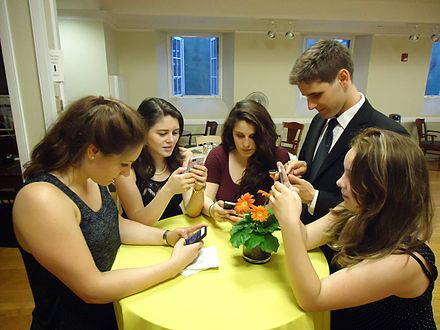Courageous, caring generation corrupted not by tech but crushed by parental pressure for endgame
I am Gen Z. I am caring, compassionate and passionate, according to an article in Huffington Post. But at the same time, I also overwork myself and am overly involved in activities and sports.
When it comes to the tail end of the millennial generation and to Gen Z, most people’s preconceived notions would differ from the article. They’ll say many people from the two age groups are stuck to their mobile devices, unable to socialize and live in the present.
I received a text with a link to the HuffPost article, “The Three Most Important Questions You Can Ask Your Teenager.” I was confused why this was coming from my 20 year old brother. It seemed more like something that my parents would send me. But, of course, I clicked it, because being teenagers, we love clicking things.
I missed the cutoff by two years to be in the late millennial generation. The latest of the millennials was born in 2000. After that comes us, Generation Z, also known as iGen. The two groups are notorious for being addicted to social media, phones, constant connectivity and technology.
While technology is an important factor in our lives today, this group of the population is caring, curious and far more passionate than you may think. These generations are changing the world. According to the Huffington Post article by Michael Mulligan, “They embrace diversity like no generation before them. They seek to serve the dispossessed and the disadvantaged. They work to find green solutions to the environmental mess we have bequeathed them. In this regard, they are focussed and unrelenting: a good thing for all of us.”
But, the most important question is, why is this generation, at the same time, so anxious and depressed? Many of these kind, compassionate people are struggling with all sorts of mental illnesses. Some experts say the root cause is technology. Or maybe it’s people, parents in particular.
The pressure to get straight A’s, take the hardest classes and then get involved with extracurriculars is exhausting.
“This generation of highly accomplished, college-bound students have been robbed of their independence because they have been raised in a petri dish for one purpose only: to attend an elite college that ensures their and their families’ economic and social status,” William Deresiewicz, a former Yale professor, said in the article. “Instead of being nurtured towards real curiosity and a genuine sense of citizenship, these millennials are conditioned to think that everything they do is for the purpose of looking good in the eyes of admissions officers and employers: You earn good grades not because they mean you are learning something, but rather because they will help you stand out from your peers when applying to the Ivies. You engage in community service not because you wish genuinely to make a positive difference in the lives of others but rather because that is how you burnish your resume—service as a check-off box. You play sports not because they build character and teamwork and are a whole lot of fun, but because you want to try to get recruited for a college team. You study art or music not because you wish to refine your understanding of human nature, creativity and culture but because it will help you look smarter.”
The issue here is that high school students end up spending their whole life trying to do the right thing and look good, but when they arrive at college, they often end up lacking motivation and direction. This could be one of the reasons why the depression rate in college has soared over recent years. Parents are teaching children that the outcome is crucial. What happens in the end matters, but one of the most important aspects of any game is the joy during it. Being in the present is key to appreciating life.
“A solution to start could be for parents to stop asking —What grade did you get? What team did you make?—and begin asking Who, Where and How? Who tells us who we are? Where we want to go with our lives? And most importantly, how we get there?,” said Mulligan.
Our drive to get there is quite important. I have caught myself doing the opposite. I have been too focused on the end result: on the good grades, not about the learning. I need to memorize this set of terms because if I fail this, then I can’t get into college. Everything has a result. Everything is about an end goal, but the end goal is college. People are struggling because when they make it there, there’s nothing left. They made it, but did they really?
“No one wins,” wrote Mulligan.
What is missing is passion. The drive should be to learn and the grade comes after. Education is a privilege. So many of us are fortunate to have the opportunity to walk into a classroom to learn everyday.
“So Generation Z is on its way,” wrote Mulligan. “Let’s go back to the basics. Let’s help them understand that learning is valuable in and of itself; that hard work, genuine curiosity, and heartfelt passion pave the way to a life well lived; and that real success comes when you can look at your life and say, ‘I have done my best to make a positive difference in the lives of others and the world we live in.'”
The purpose of this is not to blame parents, but to bring a new perspective, to get everyone to understand it’s not always about the endgame. I have realized that if everyone had a little more positivity and passion, we would be in classes, extracurriculars and sports simply for the opportunity to appreciate something new.
“To return to where we started: The millennials are accomplishing great things, caring about important things. But too many of them look inside only to peer into a void that we, at least in part, have helped to create,” Mulligan said in the article. “In our efforts to push our kids ahead, we have forgotten to ask why pushing ahead is important in the first place. What future, what adulthood are they pushing to?”
I found myself sending Mulligan’s article to many relatives and friends. I hope they trust “just” an 18-year-old from Gen Z.
Millennials and Gen Zs are compassionate, caring and ready to change the world. We need to think more about having passion and purpose when learning. It all starts with parents.
Charlotte is a sophomore at Boston University and a PMHS 2020 graduate. Charlotte found her passion for journalism in 4th grade, when she joined the Colonial...














Kathleen M Wagner • Feb 27, 2020 at 4:11 pm
Parents need to accustom themselves to the idea that their children might be ordinary. When my parents were having their family in the Forties and Fifties, their kind of people didn’t choose to have children and polish them up to be lifestyle accessories that did credit to their taste and talent. Children came, and you did your best with their minds and characters, and figured it would great if none of them ever got brought home by the cops. Certainly nobody ever drove me to excel at school. I took the hard courses because I liked them and got all As (though we used a scale of one hundred, for greater exactness in establishing class ranks) because they were easy for me. I didn’t do much studying. I sang in chorus and acted in plays because I enjoyed them. When I went to Yale I wasn’t nearly the best student there, but that was okay with me. If your children are exhausting themselves to impress an admissions committee so they can exhaust themselves in themselves in college and then again in graduate school, it’s time to consider that perhaps this isn’t the right life for them. They might be happier and healthier getting Bs and going to an okay college and preparing to have an honorable, non-swanky career. Or – where’s the fainting couch? – they might even enjoy training for a trade and becoming an electrician, a florist, a chef, or a plumber. Yes, children ought to try hard and do their best in school. If their best isn’t Ivy-grade, it benefits nobody to act as if they’re failures and disgraces, and a little more hectoring will do the trick and make them worthy to be loved. Stuff that.